May 15, 2013 – Multiple factors can spark a person’s interest in a law career. For some, that career choice becomes a decades-long journey. Bar members who have reached the 50-year milestone will be honored today at a special celebration at the Delafield Hotel in Delafield.
This article explores the career paths of five who found their way to a seat on the bench or an academic post. They join more than 100 Wisconsin-licensed lawyers who were admitted to the bar in 1963. The next issue of InsideTrack will feature five more honorees – Lawrence Bugge, Phillip Hellmuth, Tod Hodan, James Kolka, and Jack O’Brien – who steered their careers in other directions.
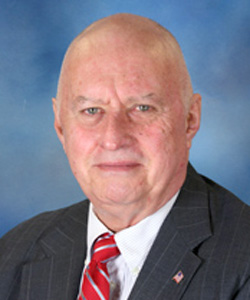
Jack Kircher: The best part of being a law professor is watching law students develop, especially in their first year, when many don’t know what a source is or how to spell ‘collateral.”
Jack Kircher: Marquette Times Four
The best part of being a law professor, says John “Jack” Kircher, is watching law students develop, especially in their first year, when many “don’t know what a source is or how to spell ‘collateral,’” he says. “Then suddenly they’re talking like lawyers, and they have a grasp of an area of the law. It’s interesting to see the evolution.”
Fifty-three years ago, Kircher was a OneL himself. In fact, he’s now a 4M, he points out: a graduate of Marquette High School, Marquette University, and Marquette University Law School, and, since 1970, a member of the law school faculty.
The career turn that eventually led him to academe started with a phone call in 1966. At the time, Kircher was practicing at a Port Washington firm, where he went to work immediately after earning his J.D.
“I got a all from Jim Ghiardi, a former law school professor of mine,” Kircher recalls, “who was running the Defense Research Institute (DRI) in Milwaukee. He was looking for an assistant.” The DRI, now located in Chicago, is a professional association of lawyers involved in defense of civil litigation.
He took the job, and when Ghiardi became president of the State Bar in 1970, he asked Kircher to take over teaching his insurance law classes at Marquette. Kircher agreed, while also continuing to work at DRI.
“In about 1980, I figured two full-time jobs was one too many,” he says, “so I decided to concentrate exclusively on teaching.” Today, Kircher teaches a full course-load, including classes in torts, insurance, and product liability, and a seminar in advanced issues in torts.
The way his career unfolded was “very serendipitous,” Kircher observes. “And I was very fortunate to have Jim as my mentor. He’s still perking along at age 94 and is now an emeritus professor here at Marquette.”
Kircher has no plans to shift to emeritus status anytime soon, as long as student evaluations continue to show he’s got what it takes to do the job. “Bob Habush, who’s a couple of years older than I am, came in to talk to my product liability class yesterday,” he says. “He and I were talking, and we’re both of a mind that we still like what we’re doing. So why stop doing it?”
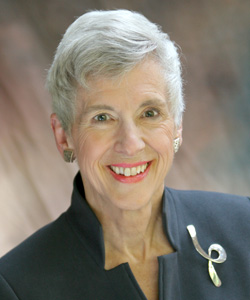
Barbara Crabb: Her fascination with the law stems from family influence. Her father, uncle, and maternal grandfather were lawyers, and her mother “always wished she’d been one.”
Barbara Crabb: Up for Challenges
Barbara Crabb notes that as a federal judge, you sometimes get what she refers to as “interesting mail.” Emotionally charged issues have landed in her court many a time during her 34-year career with the U.S. District Court for the Western District of Wisconsin.
In Crabb’s view, the most challenging matters she’s faced were the tribal treaty rights cases, which first came before Judge James Doyle in the early 1970s. Crabb picked up where he left off in the mid-1980s. “He’d decided the contours of the tribes’ rights,” she says. “What I did was determine how those played out in terms of each kind of resource – muskie, deer, trees, and so on.”
Due to tensions up north in those days, her family cut back on trips there. Once when they did go she remembers stopping at a Minocqua gas station on the way home. When her husband went inside to pay, he discovered an “impeach Crabb” sign on the counter. “He came out,” she recalls, “and told me, ‘I decided to pay cash’” to avoid having to sign his name on a receipt.
Despite the strain that sometimes comes with the job, Crabb says what she likes best about being a federal judge is being “in the middle of things. Some cases are pretty cut-and-dried. But a lot of them are fascinating.”
Her fascination with the law stems from family influence. Her father, uncle, and maternal grandfather were lawyers, and her mother “always wished she’d been one,” Crabb says. What had been a dream for her mother became a reality for Crabb when she enrolled at U.W. Law School in 1960.
Dianne Molvig is a frequent contributor to area and national publications.
After law school, she worked for a Madison firm for a few years before her husband’s job took them to Milwaukee. When they returned to Madison in 1968, Willard Hurst at the U.W. Law School asked her to be his research assistant. Other research projects followed in which she worked with George Bunn, Herman Goldstein, and Frank Remington.
Then Judge Doyle hired her as a magistrate in his court in 1971. In that position she got to handle initial appearances, preliminary hearings, an occasional trial, and so on. After eight years, she weighed her next step.
“I enjoyed being a magistrate,” she says, “but there were so many things I couldn’t do because I didn’t have the authority. I wanted to do more – to hold more trials, write more opinions.” She applied for an open spot on the federal bench, and President Carter appointed her in 1979.
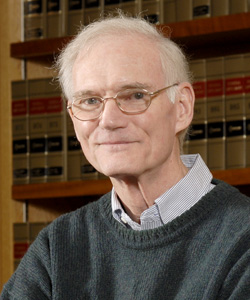
Larry Church: “I teach not so much the law itself. I try to teach how to deal with the law, how to argue it, litigate it, give advice to clients, negotiate … how to think.”
Larry Church: Worldly Experiences
Larry Church has shaped a law career that’s enabled him to blend his love of travel, learning about other cultures, and teaching. A summer during high school as an exchange student in Germany sparked the first two of those passions. As for the third, “I come from a family of teachers,” Church says, noting that both his father and grandfather had long teaching careers.
Church’s first taste of teaching came right after he got his degree at the U.W. Law School. He signed up for a two-year stint in the Peace Corps in Ethiopia, where he taught at the country’s first-ever law school at Haile Selassie University. With a new constitutional monarchy, Selassie wanted to introduce the European civil law system to Ethiopia.
“He was very interested in education,” Church says, “and used to wander into the law school from time to time. It was a very different time then. He didn’t seem to worry about assassination.” Selassie was ousted in a coup in 1974 and died under suspicious circumstances a year later.
After returning from the Peace Corps in 1965, Church practiced at Foley & Lardner in Milwaukee for three years. But the teaching bug had bitten. “I liked practice,” he says, “but I liked teaching more.”
He joined the U.W. Law School faculty in 1968 and remains there today, teaching comparative law, constitutional law, legal processes, and property law. “I teach not so much the law itself,” he says. “That’s changing all the time, and it’s written down. You can look it up. I try to teach how to deal with the law, how to argue it, litigate it, give advice to clients, negotiate … how to think.”
He’s also lectured or taught law on five continents during his career. That includes a stretch in 1971-72 in Afghanistan, where he was supposed to teach at the law school in Kabul. He was there two weeks before mayhem erupted.
“There were groups of students and teachers who began to not listen to each other,” he says. Tensions grew between those who were forebears of today’s Taliban and others who followed Communist doctrine. Shouting turned into throwing rocks and then shooting bullets, foreshadowing worse turmoil to come. The university closed, and instead of teaching, Church spent the year advising the Afghan supreme court.
Given Church’s interests, if he hadn’t pursued a teaching career, he might have joined the U.S. Foreign Service. But he’s never doubted that teaching is his niche. “I liked teaching from the start,” he says. “I enjoy the flexibility and the stimulation.”
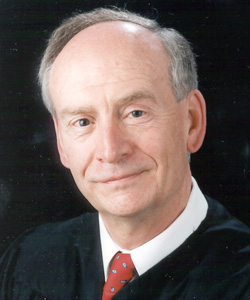
N. Patrick Crooks: The desire to move from private practice to the bench was spurred by “the idea of wanting the opportunity to have an impact.”
N. Patrick Crooks: Seeking to Have an Impact
A proclivity for the law seems to be part of the Crooks family’s DNA. “My father always said that he wished he’d been able to be a lawyer,” recalls N. Patrick Crooks, a Wisconsin Supreme Court justice. “But he was from a family of 12 children, so he never had the opportunity” to advance his education.
Crooks did what his father was never able to do, and now five of his six children also have become lawyers. For them, “I think it was sibling rivalry, to be honest with you,” he says.
Crooks, a Green Bay native and St. Norbert College graduate, got his J.D. from the University of Notre Dame. After graduation, he worked for a couple of months in a Green Bay law firm before going on active duty in the U.S. Army during the Vietnam War. After finishing training at Ft. Benning, Ga., to become an infantry officer, he attended the Army’s legal school at the University of Virginia. He then served for two-and-a-half years at the Pentagon in the Army’s Office of the Judge Advocate General.
By 1966, he was back in private practice in Green Bay, where he remained for 11 years. His experiences with problems he saw in the juvenile justice system spurred him to consider becoming a county judge. “Several people urged me to put in my name for an appointment,” Crooks says.
Governor Martin Schreiber appointed Crooks to the Brown County Court, soon to become the Brown County Circuit Court under the new system. The desire to move from private practice to the bench was spurred by “the idea of wanting the opportunity to have an impact,” Crooks says.
After 19 years on the circuit court, he decided to throw his hat in the ring, along with six other primary candidates, to run for the Wisconsin Supreme Court in 1996. He eventually emerged the victor and got re-elected in 2006 without opposition.
As a member of the state’s highest court, one “can have a wider impact,” Crooks says. “On a collegial court, you can sometimes convince others to come to what you think is the right decision. You have an impact in terms of the way you write opinions. You’re setting precedent on a statewide level. I think all of those things are important.”
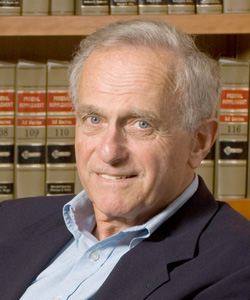
Frank Tuerkheimer: “The idea of litigating and doing it because you wanted to, not because you had to make the mortgage payment, struck me as really attractive.”
Frank Tuerkheimer: Blending Classroom and Courtroom
When asked what he’s doing these days, Frank Tuerkheimer replies, “I’m teaching evidence at the New York Law School. I just filed a brief in our Alabama death penalty case (which he’s been involved in since 1997). I’m continuing to do research and writing about Holocaust trials and just published an article in the Loyola of Los Angeles International Comparative Law Review. And I do a lot of biking.”
In other words, Tuerkheimer’s life is almost as multifarious now as it was when he was a professor at the U.W. Law School, which he left in 2009. Since 2000, he and wife Barbara, also an attorney, have split their time about evenly between Madison and New York City.
Tuerkheimer readily admits that many of his early law career choices were “by default.” By 1970, when he was an assistant U.S. attorney in New York, he decided he’d like to try teaching law. The U.W. Law School had an opening, and he got the job.
He taught there for 39 years, taking leave in 1973-75 to join the Watergate prosecution team, which he viewed as a chance to be involved in a significant historical event. “I appreciated the law school’s tremendous flexibility in allowing me to do that,” Tuerkheimer says.
He’ll return to the law school this fall to teach a special seminar on Watergate, bringing in John Dean, Nixon’s White House Counsel, to join in the discussion for one session.
Tuerkheimer took another leave when President Carter appointed him to be a U.S. attorney for the Western District of Wisconsin from 1977-81. Then it was back to teaching. But Tuerkheimer also wanted to continue litigation work. So, in 1985, he assumed of-counsel status at LaFollette Sinykin (now Godfrey & Kahn) in Madison.
“The idea of litigating and doing it because you wanted to, not because you had to make the mortgage payment, struck me as really attractive,” he says.
He litigated a number of diverse cases over many years, which he found to be an excellent complement to his teaching. “The beauty of it was that I was teaching what I was doing,” he says.
What Tuerkheimer has found most rewarding about his law career is “an amalgam of everything,” he says. “I think what’s most satisfying is working with the law and ending up with people feeling that the system works. That doesn’t happen all the time. But when it does, it’s very uplifting to be a part of that.”
Others 50-year Members Honored
The State Bar honors more than 100 Wisconsin-licensed lawyers who pass the 50-year milestone in the legal profession at today’s celebration in Delafield. A reception begins at 11:30 a.m., followed by lunch. According to the State Bar’s records, the following lawyers were admitted to the bar in 1963.
Charlotte Adelman, Wilmette, Ill.
Dale W. Arenz, Waukesha
Carl W. Backus, Milwaukee
Gary A. Bader, Park Falls
James J. Barden, Cherry Hill, N.J.
Kenneth R. Baumgartner, Kenosha
Robert F. Berger, Virginia, Minn.
Robert J. Bonner, Milwaukee
Charles R. Brown, Washington, D.C.
Lawrence J. Bugge, Madison
John L. Castellani, Milwaukee
Richard Joseph Chadwick, Chanhassen, Minn.
David S. Chernoff, Chicago
William L. Church, Madison
Wendell W. Clancy, Saint Charles, Ill.
Felice Davis Cohen, Washington, D.C.
Harry B. Conlon Jr., De Pere
Hon. Barbara B. Crabb, Madison
Frank T. Crivello, Naples, Fla.
Justice Neil Patrick Crooks, Madison
Peter N. Davis, Columbia, Mo.
Bernard T. Decker, Orlando, Fla.
Lawrence J. Downer, Couderay
Jerome E. Duckler, Milwaukee
Lawrence W. Durning, Eau Claire
Howard E. Dutcher, Wautoma
James O. Ebbeson, Sturgeon Bay
Paul B. Edwards, Burlington
James N. Effland, Green Bay
Hon. William F. Eich, Madison
John F. Englund, Iron Mountain, Mich.
Jerry A. Fine, Milwaukee
Thomas J. Fink, Menasha
Frederick W. Fischer, Eau Claire
Timothy C. Frautschi, Milwaukee
Bernard R. Fredrickson, Lake Nebagamon
Mark A. Gehring, Milwaukee
Jon Peter Genrich, Minneapolis
William M. Graham, Libertyville, Ill.
Everett B. Hale, Medford
Robert H. Halvorsen, Sheboygan
Jerry Haushalter, Las Vegas
Phillip J. Hellmuth, Madison
Theodore J. Hodan, Milwaukee
Wm. Pharis Horton, Madison
James O. Huber, Hartland
Elenie K. Huszagh, Chicago
Allan E. Iding, Milwaukee
Bruce E. Johnson, Los Angeles
George W. Johnson, Eagle River
R. Gilman Johnson, Ingleside, Ill.
Richard W. Johnson, Red Wing, Minn.
Eugene L. Kaluzny, Milwaukee
Thomas C. Kilgore, Ripon
John J. Kircher, Milwaukee
Thomas L. Kissel, Hartford
James W. Kolka, Marietta, Ga.
Thomas N. Kostner, Bloomer
George E. Krippner, Geneva, Ill.
Terrence J. Kurtzweil, Reedsburg
Harvey I. Lapin, Northbrook, Ill.
Charles R. Larsen, Mc Farland
Gerald J. Lenoble, Milwaukee
Phillip M. Lev, San Mateo, Calif.
David Loeffler, Milwaukee
James R. Long, Appleton |
James L. Lowe, Aspen, Colo.
Arthur F. Lubke Jr., Waukesha
James D. MacDonald, Union Grove
Allan O. Maki, Venice, Fla.
Stephen M. Margolin, Chicago
Donald E. Mayew, Kenosha
Angus R. McIntyre, Appleton
James C. McKay Jr., Stoughton
Mac A. McKichan Jr., Platteville
Maurice J. McSweeney, Milwaukee
James Menehan, Monroe
Arthur B. Mitchel, Pewaukee
G. Hans Moede III, Milwaukee
Thomas Gerald Moher, Sault Sainte Marie, Mich.
Russ R. Mueller, Glendale
Robert G. Munro, Grand Rapids, Mich.
William J. Neely, Newtown, Pa.
Hon. Gerald Charles Nichol, Madison
Hon. John M. Nolan, Merrill
Richard W. Nuernberg, Madison
John N. O'Brien, Delavan
John L. O'Brien, Eagle River
Terence J. O'Loughlin, Saint Paul, Minn.
David R. Olson, Milwaukee
John O. Olson, Lake Geneva
Joseph R. Olson, Kenosha
Douglas C. Pearce, Dubuque, Iowa
Barton M. Peck, Glendale
Robert F. Penn, Stevens Point
Costa Perchem, Dover, N.J.
Raymond S.E. Pushkar, Washington, D.C.
Jerome E. Randall, Wauwatosa
Richard C. Ruppin, Merrimac
Robert J. Ruth, Verona
Barbara Faith Sachs, West Des Moines, Iowa
Russell C. Schallert, Mequon
William E. Schirger, Pecatonica, Ill.
Philip F. Schlichting, Naples, Fla.
Neal E. Schmidt, Cape Neddick, Maine
Alan P. Schrinsky, Whitefish Bay
Frederick Schubert, La Crosse
J. Richard Sendik, Naples, Fla.
David Henry Simon, Los Angeles
George D. Simos, Oconomowoc
Sidney Sodos, Brookfield
Michael B. Spitz, Attleboro, Mass.
Martin R. Stein, Milwaukee
Michael I. Tarnoff, Milwaukee
H. Dale Thieben, Madison
Timothy A. Tierney, Madison
Leonard A. Tokus, Milwaukee
Roy T. Traynor, Elcho
Joel Trosch, Arlington, Va.
Frank M. Tuerkheimer, Madison
R. Dirk Van Horne, Raleigh, N.C.
John M. Waggoner, Madison
Van B. Wake Jr., Wausau
John J. Wargo, Racine
Walter G. Wefel Jr., Wisconsin Rapids
Harvey L. Wendel, Madison
Richard W. Westring, Washington Island
William S. Wiener, Milwaukee
Roy S. Wilcox, Madison
Leo Wotan Jr., Elgin, Ill.
Gerald E. Wright, San Francisco
Dale G. Zimmerman, Naperville, Ill. |
